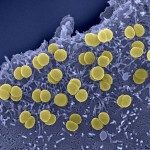Link to Pubmed [PMID] – 11222561
J. Antimicrob. Chemother. 2001 Mar;47(3):285-96
We studied polymorphism of penA (which encodes penicillin-binding protein 2) in 13 strains of Neisseria meningitidis susceptible to penicillin (pen(S)) and 12 strains with reduced susceptibility to penicillin (pen(I)). These strains differed in geographical origin. Serological and genetic typing showed that they were highly diverse and belonged to several genetic lineages. Restriction analysis and DNA sequencing of penA showed that all pen(S) strains had the same penA allele regardless of genetic group, whereas pen(I) strains harboured various penA alleles. Transformation with amplicons of penA and genomic DNA from several pen(I) strains conferred the pen(I) phenotype on a pen(S) strain. Thus, reduction in susceptibility to penicillin is directly related to changes in penA and analysis of penA polymorphisms could be used as a reliable tool for characterizing meningococcal strains in terms of their susceptibility to penicillin.

